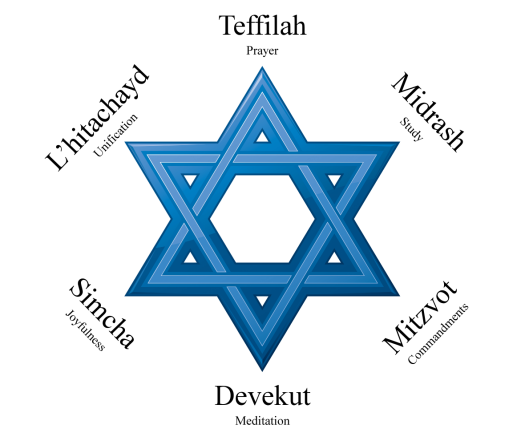Core Teachings of Congregation Ner Tamid Shel Torah

Tefillah (Prayer)
The term Tefillah (תפלה) is the Hebrew word for prayer. In Yiddish the act of praying is often referred to as davening, which comes from the Yiddish word davnen (דאַוונען) which translates to pray as well. Prayer is the most powerful expression of love and gratitude a person can offer before Hashem. Unfortunately, many people alive today find it difficult to express the prayer that is locked deep within their heart. This could be due to the fact that they were never introduced to the true nature of spiritual prayer, or they may feel intimidated by the activities or speed at which davening occurs in a traditional synagogue. The good news is that prayer can be learned. For it is the birthright of every sentient being to discover their inner voice and realize that any prayer or utterance from the heart is perfect and acceptable before Hashem.
Midrash (Study)
Midrash (study) - The term Midrash (מדרש) comes from the Hebrew verb darash (דרש) which translates to seek, study or inquire. The act of studying is the conscious act of acquiring knowledge. The most important book that is studied in the Jewish religion is the “Sefer Torah” or the five books of Moses. The study of Torah releases light into the world. The Rabbis teach that the study of Torah is the study of life, and the act of studying Torah deepens the spiritual knowledge within a person. A distinct evolution that takes place in a person as knowledge awakens deeper levels of spiritual understanding. Wisdom is finally realized as a person allows their knowledge and understanding to become kinetic and put into practice in their life.
Mitzvah (Commandment)
The term Mitzvah (מצוה) is the Hebrew word for "commandment." The plural of the word Mitzvah (מצוה) is Mitzvot (מצות.) A Mitzvah traditionally epitomizes a moral deed which is performed as a religious obligation. In the Torah there is found 613 commandments which are usually divided into two major groups, 248 positive commandments (obligations) – mitzvot aseh [מצות עשה] and 365 negative commandments (prohibitions) – mitzvot lo ta'aseh [מצות לא תעשה]. In today’s day and age, many people understand a mitzvah to be the performance of an act of human kindness. The study and performance mitzvot help increase divine light within the world as well as bring people closer together as one human family.
Devekut (Meditation)
The term Devekut (דבקות) is a Hebrew word found in the study of Kabbalah. The act of Devekut can be translated to “cleaving” which is the act of becoming spiritually closer to Hashem. Since the beginning of recorded history the practice of meditation has been a part of the spiritual evolution of countless early civilizations. In the Torah it is written that Isaac went into the field to meditate. The Hebrew language has many words that translate to describe meditation or a meditative technique. One such example is the word Hitbodedut (התבודות) “self-seclusion” which describes a type of meditation technique that was practiced and taught by Rebbe Nachman of Breslov. To this day, there is no greater facilitator of lasting peace, spiritual awareness or deep insight than the practice of meditation. Meditation has always been paramount in the study of Kabbalah and is highly necessary if an individual is seeking to facilitate a lasting positive change in their life. Many forms of meditation exist such as traditional “seated meditation” which fosters inner stillness, as well as dynamic forms meditation such as prayer or the performance of Mitzvot. As a person learns to meditate and develop Kavanah (כונה) or “spiritual intention,” it is said that the effects permeate deep into our world as well as the higher worlds of Hashem’s essence.
Simcha (Joy or Gladness)
The Hebrew word Simcha (שמחה) comes from the root word “sameyach” which means happy or glad. The Rabbis teach that life should be lived with Simcha in our hearts. This is especially true when it comes to the performance of mitzvot or good deeds. Some rabbis have taught that if a mitzvah is not performed with simcha, it is as if the mitzvah was not even performed and the effects are almost nonexistent. Prayer and Meditation should always be performed with simcha in your heart, as you are deepening the process of communing with Hashem.
L’hitachayd (to Unite or Integrate)
The Hebrew word L’hitachayd (להתאחד) translates to unite, become one or incorporate. Probably the most demanding of all the foundational principles practiced at Congregation Ner Tamid Shel Torah is the act of integration. For lasting growth to happen our knowledge must become active and kinetic in our lives. We all have personal habits we recognize, whether they are behaviors or emotions, they seem to rule our life. The question is, “where did these habits come from?” These habits became actions that have integrated themselves into our personality. Conscious integration takes work and attention. The practice of L’hitachayd is the act of consciously integrating what we have learned through study, prayer and performance of mitzvah’s to create a new behavior. Our new behavior should then permeate the way we look at the world and treat our fellow man, women, child and all sentient life… Because in the end we are all “Tzelem Elokim”

